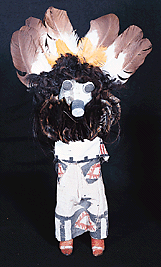Navajo Purchase Sacred Masks at Auction
December 19, 2014
Navajo Indian tribal representatives recently paid more than $9,000 at a Paris auction house to purchase seven sacred tribal masks. The purchase came after efforts by U.S. embassy officials to stop the auction had failed. Other sacred Native American artifacts, including several Hopi Kachina dolls and Pueblo masks decorated with horsehair, bone, and feathers, were bid upon. However, Hopi and Pueblo representatives viewed the auction as sacrilegious and did not take part in the sale.

Hopi Kachina doll. United States, 1900′s. Wood, cloth, feathers, and hair. 19 in. (48 cm) high. Dolls such as this one represent spirits in the Kachina religious ceremony of the Hopi Indians. (Colorado Springs Fine Art Center)
Masks are an important aspect of religious rituals in many American Indian societies. They can have powerful psychological effects on the people who wear them as well as on those who see them. In rituals, a person who wears a mask of a god or spirit may experience a sense of having stepped out of himself or even feel possessed by the supernatural being. The Navajo believe the masks are living entities that must be taken apart and returned to the earth after they are used in a ceremony. They believe such sacred objects contain the spirit of their ancestors, and they should never be sold commercially or possessed by people outside of the Navajo tribe.
U.S. officials objected to the sale because they could not establish whether the auction house in France had obtained the artifacts legally. Navajo officials argued that such objects could only have come into their possession if they were stolen.


